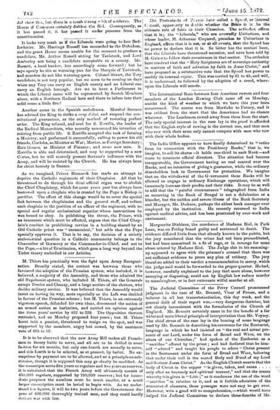The India Office appears to have finally determined to "retire
from its cotmection with the Presidency Banks," that is, we imagine, to sell its shares —it holds one-third in each Bank—and cease to nominate official directors. The situation had become insupportable, the Government having no real control over the Banks, and no intention of giving a guarantee, while the ordinary shareholders look to Government for protection. We imagine that on the withdrawal of the G wernment these Banks will be allowed to engage in ordinary Exchange operations, which will immensely increase their profits and their risks. It may be as well to add that the "painful circumstance" telegraphed from India as occurring in the Bank of Bengal is not a defalcation or a blunder, but the sudden and severe illness of the Bank Secretary and Manager, Mr. Dickson, perhaps the ablest bank manager ever employed by the institution. He recently returned to India against medical advice, and has been prostrated by over-work and excitement.


































 Previous page
Previous page